Wayne C. Allen's Blog, page 5
September 29, 2024
True Intimacy — Set Yourself Free Series
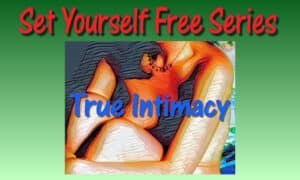
True intimacy is found as we let go of our dependence on our minds, and begin to add in a body based focus.

PDF downloadable book and online videos. More info here.
So, I really still amaze myself over the reluctance most Westerners have to being fully in their bodies — to learn to simply listen to the wisdom of their bodies.“Enlightenment must be lived here and now through this very body or else it is not genuine. In this body and mind we find the cause of suffering and the end of suffering. For awakening to be an opening into freedom in this very life, the body must be its ground.“
After the Ecstasy, the Laundry, Jack Kornfield, p. 178

Some are in total denial — are unaware of the quirks and blockages that are messing with their free movement.
Others are stuck in blame.
One of the most interesting Bodywork moments is when a recipient sufficiently lets go of their pain and drama. Energy begins to flow, and a look of surprise fills their face.
It’s like they can’t believe their body could feel so good, so alive.
I get it. It was all new to me once, too.I had “classical” training in psychotherapy. I did academic courses for two years, and during that time was also an Intern at a counselling centre. There, the techniques of counselling were taught; there, I earned my spurs working with clients, using the techniques I had learned.
We had a week long training in “Bioenergetics,” a style of bodywork/counselling developed by Alexander Lowen, and built upon the work of Wilhelm Reich. We breathed, a lot, and we stretched, and tried various postures to get our bodies to shake.
I can clearly remember doing the stuff under protest — I could make neither heads nor tails of the whole process; I was firmly in the “head” camp of psychotherapy.
No, I “knew” that the key to unlocking the knots of despair that my clients were feeling lay in helping them to understand — they simply needed to learn how to better use their minds.
I graduated in ’83, and got my Masters’ degree… and I just kept talking. What was happening for me, and for my clients at the bodily / feeling level was the last thing I was interested in.
My goal was to “fix,” and to have everyone think I was smart.
In ’96, when I was still in the church, “playing Minister,” my body gave up on me. And for good reason.
My church approach was like my counselling approach, back then, was quite Western. (By the bye, Western and Eastern are not geographical but ideological.) I would work and work and work, then get the flu or hurt my back… or something… and have to stop.
I’d go for acupuncture and herbs, get strong, and start working again.
Anyway, in 1996, I really had done a number on myself — 2 churches, hours of extras for Advent and Christmas. Then, I set up a huge amount of extra activities for Lent, doubled my client load at my counselling centre, and made it to the morning of Ash Wednesday, the beginning of Lent.
I woke up in a black, dark fog, and my body would barely support me. With great reluctance, I announced that evening that I was putting all the extras on hold. I needed a break.
I had it almost right. I was actually broken.I went to see my therapist the next day. She suggested that after I recovered my physical strength, I go off to The Haven to do Phase 1 that July. I signed up immediately, expecting a whole lot of theory — talking, etc. I was planning on being wise.
Imagine my chagrin, a day into the Phase, being “invited” to lie down and breathe. To do Bioenergetics. And, horrors, they expected me to receive Bodywork. I “knew” nothing would emerge from my body. Right.Two thumbs, elegantly and deeply applied, and I was deep into my body, screaming, “What about me?” My body shifted, dragging my mind, kicking and screaming, with it. My mind was initially embarrassed about my body’s deep feelings, then resigned, then interested, then ecstatic.
I may be slow and stupid, but at least I’m “flexible.”My body and language shifted so much that I was “kicked out” of the Church within 6 weeks of returning from Phase. Best thing that ever happened.
I did stress myself, so I want back into therapy. My therapist gave me the gift of what I call “the final piece.”
As I tried to use my mind — to be smart, to figure out what was up, she stopped me. She then suggested I take 6 months and simply say, “I don’t know.” Hardest thing I ever did, and the most rewarding.
I can cheerfully say, all these years later, “I still don’t know.”I am, however, excruciatingly aware of my thoughts, feelings, energy, and the movement of my body. As I sit, as I focus my attention without playing mental games, I somehow know, and know what I do not know.
Back in the day, clients initially wanted explanations for everything. “Why do I feel this?” “What does this mean?” They were taken aback by my disinterest in their “head” questions.
Instead, I would wonder what they were feeling. I’d wonder what needs to get “out” of their bodies. I’d wonder who is buried in there, under the surface, dying to emerge.
I’d wonder, in short, if they were courageous enough to enter into themselves fully, as opposed to stopping at their heads.I am still disinterested in what friends tell me is going on up there in their little heads. All the stories, the dramas, the stuck-ness. It doesn’t matter how educated they are: all that gets them is “dumb, but with bigger words.”
I invite my frieds to find someone to do Bodywork with them. I invite them to meditate.
I wonder with them how freely they give themselves over to the ecstasy that is a part of our nature.
I wonder, often, about their willingness to feel the depths of their pain, so that they will also be able to feel the heights of their passion.
How scared of their power, passion and energy are they? What would it be like for them to enter into a world that is alive and filled with feeling? Will they “go there?”
Ultimately, there is a choice to be made here. The choice is to abandon knowing anything for understanding everything. It’s letting go of the need to be right, replacing that with the need to simply be.
It’s about being whole — feeling, reflecting, acting, changing as the world about us changes, as we ourselves learn to mke better choices.
An interesting walk, for the courageous explorer. Welcome aboard.

PDF downloadable book and online videos. More info here.
Facebook TwitterSeptember 22, 2024
Breaking Through Beliefs — Set Yourself Free Series
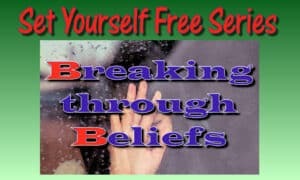
Breaking Through Beliefs — it’s easy to get caught in the rightness of our beliefs. We then end up defending. Instead, there’s simple awareness.

Looking for more on this topic?
Check out my book,
Half Asleep in the Buddha Hall.
Wayne’s “Eastern” book takes you by the hand and helps you to find peace of mind. Half Asleep in the Buddha Hall is a Zen-based guide to living life fully and deeply.
So, this guy I know likes to think he’s the smartest guy in the room. In fact, he’ll go so far as to declare himself so. He also has somehow persuaded his wife to play this game. He’ll say something, and then look at her, and she’ll go, “Oh! I never thought of it that way! You’re so smart!” or “You sure do know a lot!”
It’s kinda gag-worthy, especially since I know that I’m the smartest person in the room… ROTFL 
The other day, he (after 7 beers in 4 hours) told me for a second time in a month or so why he despises the Monarchy. It occurred to me that he was pretty stuck. What I noticed was that his belief system seemed “fixed.” Despite being well-read and knowledgeable, there’s no room for movement in his thinking.
So, maybe we could say he’s smart, but not wiseI see this phenomenon a lot–people getting stuck in a “thought trough.” You notice this especially with Trump followers and the MAGA crowd.
Somewhere, sometime, they concluded something, and dynamite can’t budge them from it.
In relationships, it’s often around rules and roles. Who should do what with which, and to whom kind of things. It also happens around subjects; for example, the infamous categories “Mommy told you not to talk about.” Sex, religion, politics.
My favourite story here involved a young couple we knew.Both were staunch Baptists; he’d been to Bible College. He’d regularly go off on his view of sin and hell, to which he was sure I was going.

We’d known her since she was 12 or so, and had watched her grow up. Sex was never discussed, and she was quite conservative.
One day, after their marriage, they declared that she was going to get a breast enlargement, which was a surprise.
A few months later, she and the new, quite large supplements arrived.
Husband was beaming. He then announced that and he and she had started doing the “Hot Wife” thing, which Urban Dictionary defines as:
“A married woman who has sexual relations with other men, with the husbands approval. Usually while the husband watches or joins.”
As you might expect, I have no trouble with “hot wives” or any other thing anyone wants to do, provided everyone agrees.
My problem was with the contradiction between his endless Baptist rants about sinfulness and hell, and his lifestyle choices. It smacks of hypocrisy.
It begs the question: why is this so hard for us to see?
I guess, given the young man’s protestations when I mentioned all of this to him, that he’s got his Christian beliefs well and truly boxed up, and unavailable for discussion, let alone change.
In another sealed box is his sex life, and never are the two to meet.
Same with the first story. He’s got “Monarchy belief” in a box and there is no room for movement or even discussion.
These rigidities feel good to us, because what kicks in a certain sense of prideful, arrogant invincibility. I know what I know because what I know is right, and besides, I know it.
If that seemed redundant, it’s because it is. It’s based upon belief, and that’s one of those difficult things.
It’s altogether another thing to recognize how tenuous belief is. Yet, that is where wisdom lies.
I think it’s really important to subject beliefs and knowledge to a testThe test is, how is my belief going over? How are others reacting to my rigid statements of belief?
Such questions allow us to open up a bit, and lightly explore.
I’m not talking about changing or denying your beliefs, by the way, although that might happen. With the “hot wife” guy, there has to be a moment or two where he questions how this fits with his rigid Christian fundamentalism.
Because the way things are, there is a huge contradiction. If he notices, he might also notice how he’s keeping those two sets of beliefs separate and segregated; they just can’t live together. And noticing, he might then take some time to explore the two sets, and see how he keeps them apart. He then might want to look at his Christian and secular views re. sex. And work at bringing them into agreement.
This is the Zen of not knowingNot knowing is not “not knowing” — it’s being flexible.
It’s holding beliefs lightly, and remaining open to the possibility of another viewpoint or two. It’s deciding, perhaps, not to decide — not to hold one’s beliefs rigidly. It’s acknowledging that there are tons of cultural — religious — political belief systems out there, and having a death-grip on any of them is often a problem. It might even be holding on to your beliefs, yet letting others off the hook — not shoving your views down others’ throats. Becoming more and more comfortable simply being with others, without needing them to believe what you believe, without insulting their beliefs, without needing to judge.Not easy, especially with one’s closely held beliefs, but better than ending your life having never felt the freedom of just letting go.
Facebook TwitterSeptember 15, 2024
The Prison of Body Resistance — Set Yourself Free Series
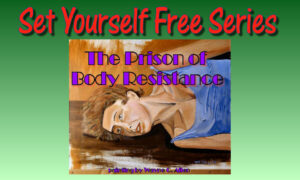
The Prison of Body Resistance — we find ourselves trapped in a body that seems foreign to us. Here are some suggestions geared toward letting go.

The. Best. Relationship. Ever.
Our minds can be quite locked up. Because we’re used to the games our minds play, however, we’re comfortable living between our ears.
A strange thing happened at the time of the Enlightenment. People were split in three.Prior to this time, life in the West was pretty regimented. The Church held sway over pretty much everything. Sickness was thought of as a sign of sinfulness. Health care was a joke — the town surgeon was likely the barber.
If you needed medicine, it came from a woman versed in herbs — and she needed to keep her head down, as the Church didn’t like intrusion. She could easily be branded a witch.
The Enlightenment was an opening of the mind.
Education rose in importance, as did fledgling Universities. Medicine became a science, and was taught to doctors.
Somehow the Church came to its senses long enough to realize this “newfangled education thing” wasn’t going away. The Church agreed to a division.
The Church got the Spirit.
The doctors were assigned the body. The educators got sole possession of the mind (until psychoanalysis came along — a division again happened at that point.)
The educators quickly rose to the fore, as change was coming from this part of the triumvirate. Science was plotting the universe, creating machines, promoting logic — and shunting the Church off into a corner from which is has yet (thankfully) to return.
And medicine decided that, like all sciences, division led somewhere. Once dissection was approved, medicine built its bones on the idea that if only we look to the smallest, we will understand the whole.
The Mind was elevated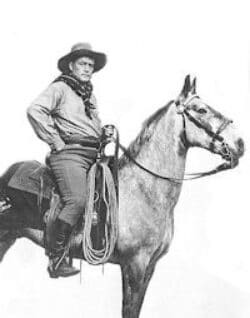
The Spirit was seen as quaint. The Mind was seen as the principal aspect that made humans human.
The analogy of horse and rider prevailed — the mind was like the rider of the horse — in possession of knowledge, intellect, wisdom, and direction.
The horse (the body) was the dumb beast that got the rider from a to b.
Many of my clients had difficulty believing their bodies have a voiceAnd this is even when their bodies went quite dramatically out of control.
One client especially was fascinating to do Bodywork with. I’d touch her shoulder, and she’d say, “I feel that in my toe. What does that mean?” Or I’d press on her sternum, and she’d start to cry, and I’d almost hear a click as she popped up into her head, and told me a story.
Bodies are treated with disrespect
Bodywork is really about breaking down the walls that separate us from ourselves. The walls are 1) tightness, and 2) reluctance.
The tightness is what we learned to do to “get ourselves under control.”The reluctance is the centuries long aversion we have to thinking that our bodies have intelligence.I remember my first Bodywork session, out at Haven, with David Raithby.
I had a lot of tears and anger. I was also out there right before I got “exited” from the Church, although none of us knew that at the time.
David had just about finished. He asked me to sit up, and dug his fingers into my side intercostals.
I let out a howl, and really kind of lost it. He extended my arms out from my sides. He said,
“We’ve already had one Messiah, and look how it turned out for him.”
I, in that moment, had a whole body reaction. I thought about how my body had collapsed on me a few months earlier … a prime motivation to go to The Haven. I thought about how I kept demanding that my body do what it didn’t want to do any more. All for the “right” reasons: my “calling,” prestige, money.
I’d stayed and stayed, and my little legs were pumping in the air. Trying to run out the door.I don’t know how David saw what was up for me, although as a Bodyworker, I “saw” stuff all the time. I’d get a flash, an intuition, and I’d follow it.
I’d “push here,” as if it’s written on skin. I’d see what the recipient is resisting (often stuff to do with pelvic / sensual / sexual resistance,) and I’d go for it.
Because the body has a voice.
The body is screaming its message, and we ignore it at our perilIf you want to learn to listen to and work with your body, you’ll have to get in touch with what you are feeling.
As you feel your feelings, watch. See what you do next.Intellectualize – ask for more information, pop into your head and try to “figure it out.” In the meantime, stuff the feelings back down.Fantasize – leave your body by coming up wit your favourite story — preferably one where you get to check out of reality and play around in your head.Patch the wall — you start to feel, start to “see” what’s being held in / down / back. You start to dig in, and then, poof, “shields up!” The muscles are re-tightened, and feelings dismissed, and all is “normal” again.Or:let go – ask your body what it needs — it may need to yell, pound, cry… and then, as one client put it, it may need to completely release. If you block yourself from doing what your body needs, you will pay the price.wiggle / move — your body wants to express itself, so find ways. Dance, wiggle, move your pelvis, stretch, do yoga. Exercise your need to let your body loose.Emote — set aside time to feel your emotions fully. Create a space to let it all hang out. Find a core group of people you trust enough to be yourself.Find alternatives — do Bodywork, get acupuncture and Chinese herbal remedies.You are not the victim of your body. You are your body, as much as you are your mind. Your body is talking to you, all the time, and usually is aware of “difficulties” long before your brain clues in. :earn to pay attention.
Ask your body, “What do you need? What can I do so toast you can let go and come back into balance? What needs to happen, be let go of, danced with? And then, listen.
I suspect you’ll discover that the answer(s) are obvious.
Facebook TwitterSeptember 8, 2024
Prisons of the Spirit — Set Yourself Free Series
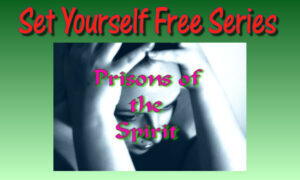
Prisons of the Spirit — we are bound both by the pull of our individual vocation and by how we stop ourselves. A word about letting go.

An excellent guide to life and living.
Learn to focus your attention of who you really are.
Being a Zen guy, I don’t actually believe in such a thing as a soul. I’m not sure what to call the “centre of self,” and really, such language is quite weighted.
I do, however, think that there is some inherent , innate capability in human beings – something that brings out the best in us. Perhaps we could describe this as our “better natures.”
In Zen, we would call this Buddha natureThis unpacks as the core abilty of every human — to recognise his / her Buddha nature. This nature is:
completely present — awakefree from attachmentsfeee from karmafree from samsara (the cycle of life, death, rebirth)I think this basically means that being fully alive is possible for everyone, and being alive looks like a calm, centered state of walking one’s path, without drama or complaint.My sense is that there is an internal, strong, sometimes overwhelming pull in a “positive” direction. Of course, what I mean by “positive” and what you mean by “positive” is likely two different things.
The thing is, I don’t want to get into any kind of discussion about whether this pull comes from some celestial being, or is just hardwired into our DNA. Needless to say, I vote for the latter option, but whatever you think is fine by me.
I’ve often described vocation as a pull, a force somewhere between a nudge and a drag. Once you start thinking vocationally, it becomes pretty obvious to you what you are pulled to be or to do. This sense, this pull, is intensely personal.
Spirits in chainsIt seems to me that there are several spiritual prisons — and they all seem to have to do with whether we are willing to let go of our need to pick at, resist, or get agreement (permission) for whatever we are being nudged to do.
We get spiritually locked up when we, rather than simply dealing with the urge, beat it to death either through inattention, overemphasis, or through wacky demands for proof or assurance of success.
This creates a dissonance – we can feel the pull, and we then get caught in mind games. We refuse to unlock ourselves to live our passion — to live out of what Taoists call the heart-mind. This dissonance is “fighting against our better natures.”
What does “better” mean?I started putting the word in quotes simply because I have no sense of what “better” means. When people use qualifiers like that, I will often ask, “Better compared to what?” I do this knowing that sometimes I’ve opened the door for quite the conversation.
One direction this can go is for the person to point to a list supposedly created or written down by someone outside of themselves — a religious text,” God,” their guru, or some mythical figure. Fundamentalists of all stripes have amazingly long lists of “goods and bads.” Or, take Trump. No. Really.
Great are the number of religious wars that continue to be fought over differing lists.
The reason that this is a prison is that an argument about “good, better, best” has nothing at all to do with actually doing something. It’s a diversion. So long as I can point my finger at another and declare him wrong, I am off the hook, and get to be blatantly, emphatically, self-righteous.
Skipping this prison — by taking responsibility for living out your vocation — is the mark of wisdom.Trusting your “better nature” takes immense courage. You’re basically letting it all hang out, without any reference to any external permission or person. You’re the source of your own permission.
This irks the hell out of judgemental people; it is really annoying to people who are stuck in inactivity. They know they ought to be getting on with their own lives, they see you getting on with yours, and they try to get you to cut it out.
Opening the prison of the spirit means standing on your own 2 feet Skate to your own music
Skate to your own music
There is no question that your mind and your body might just get involved in slowing you down.
The easiest way to do this is to keep your eyes, ears, and mind focused on the here and now. Right here, right now, all there is, is the next step.
There’s no,” I wonder how this will play in Cincinnati?”
And because your focus is on the next step, corrections are easy. There’s no way to get ahead of yourself.
Really work hard at getting a sense of what pulls you. Recognize that you are going to resist what pulls you, human nature being what it is. Recognize that there’s no way to determine in advance the “good, better, best-ness” of what pulls you. You can’t really get a consensus, and even if you did, it’s still going to come down to you doing your thing and getting it done.
So, rather than making a song and dance out of it, calm your mind, relax your body, and ask yourself, “What is the next step in the direction I’m choosing to go?”
Then, step.
Facebook TwitterSeptember 1, 2024
The Prison of Imagination — Set Yourself Free Series

The Prison of Imagination — our sense of being trapped, caught, is almost always just us, trapping ourselves.
 Simple, profound lessons in relating
Simple, profound lessons in relatingThe. Best. Relationship. Ever.
[image error]Many, many moons ago, Darbella shared a story with me.She was describing her life, and the short version was that she imagined herself alone in a castle’s tower room. Nicely appointed, door to one side, window, 20 feet up, on the other.

She said she could see the sky through the window, and hear the sounds of people, and a parade, out the window.
Dar was comfortable, but unable to participate in what she could hear and then assume was happening outside the tower.
I read the story, got a sense of how frustrated she was, given that the story was “the story of her life.”
I asked her, “Can you go inside and imagine the room?”
Dar’s good at visualizing, so she did that easily.
I said, “Would you mind going over and checking the door?”
She did… and it was unlocked!As are almost all the doors in our our lives.We are prisoners of our own imaginationFor me, a major “unlocked door” I needed to “let go of” was being a ministerI knew, back then, that as the years went by, I was more and more dissatisfied. I stayed, I admit with embarrassment, because I liked speaking in public, liked the adulation, and liked the money.
Three really bad reasons for doing stuffIt all “went South” back in 1996, and here I am, 28 years later, and none the worse for wear.
There was no downside (other than a bunch of people who likely are still mad at me… I’m used to that) — the things I imagined happening if I left that prison never happened.
I’m not being Pollyanna-ish about this — the clear truth is this:Bad stuff happens to all of us, but almost always, the consequences are not as bad as we imagine. And no matter how bad it gets, there are ways “out and through.”
Sitting in the locked jail cell, concocting horror stories, on the other hand, means a relentless flow of “day after day, all the same.”Back in my counsellor training days, the Profs taught you fallback questions — what to say if you got stuck. I seldom do, but remember the questions. I even pulled three out the other day. They are:
do you have permission to be happier than your parents?do you have permission to have a better relationship than your parents?do you have permission to be a better parent than your parents?and I’d add:
1) do you have permission to be more successful than your father or mother?
Odd, eh?And not very self responsible language, I know. Maybe better: “Do you allow yourself to…”But it is sort of like permission I give myself. I can choose to let myself exceed the standard I grew up under, and then to exceed my own standards, again and again.
I remember, for example, that my dad was a ping pong champ. He taught me to play, and by High School I was pretty good (not by today’s standards.) I played him once, and was winning. I distinctly remember a little voice, telling me “You can’t beat your dad.” I lost 3 games straight on the last point.More crucially, when I decided to end my prior two marriages, in each case, one of the first calls I made was to mom and dad, to see how they would react. They’d been married 56 years when my mom died, so my piddly 2 and 8 years seemed a betrayal oƒthe standard they had set.I knew I was thinking that way, had been making clear choices for myself for a decade, and still wanted their approval.Knowing myself, I wouldn’t have changed anything if they’d have freaked out, but I also breathed a sigh of relief when they didn’t.This is how nuts we all are.
 What do you mean I seem blocked?
What do you mean I seem blocked?There are all kinds of brakes and limitations going on, right under the surface of our consciousness. Without effort, it’s hard to see through them. So, you have to look.
They will seem like hard limitsLook for stop words — things like “always” and “never.” Or “everyone knows.” Look for how often you are craning your head around, looking for permission, for someone to blame, or wondering what others think of you and what you’re doing.
Ask yourself, “Who am I giving permission to — who gets a say about what I do, think, decide?”
You might just be surprised.Explore how you keep yourself contained — what universals you declare to keep from having to think for yourself.
What things you want to do, try, do you declare off limits, based upon fear of failure or fear of judgement.
Is doing what someone else tells you to do, for fear of ruffling feathers, really how you want to spend your life?
That door, in your locked tower… is it even locked?
Facebook TwitterAugust 25, 2024
The Myth of Sex Equaling Intimacy — The Myths Series
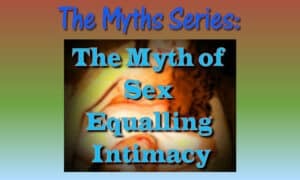
The Myth of Sex Equaling Intimacy — Intimacy is an act of continual stripping away — of revealing who we are, with total honesty.
Of Wayne’s many books, the one closest to today’s topic is: The. Best. Relationship. Ever.

Successful relationships take work.
Learn what to do to create an excellent relationship.
The. Best. Relationship. Ever.
Intimacy, it seems to me, is something that many people say they are seeking, at least in the abstract.Intimacy is not solely about dialogue nor using the Communication Model. It’s not about long walks or shared interests. It’s not about raising kids together and contributing to the running of the household. Intimacy may contain all or many of the above, but intimacy is about, first and foremost, vulnerability and trust.
Intimacy — is about openness, honesty and vulnerability.In my book, The. Best. Relationship. Ever. I wrote:
Confusing sex with intimacy
In my book This Endless Moment, I wrote about a woman who broke off her engagement because she’d had sex (on a pool table!) with a friend. She talked about how hot and chargy it was.
I asked her why she’d broken off her engagement.
“I can’t stay with my fiancé, because I must love [pool table guy] a lot! After all, I had great sex with him!”
I said, “Or you just got really horny, and had good sex. It was just sex.”
She: “Oh no! I’d never have sex with someone just because he turns me on. I only have sex with people I love, and I must love him a lot, given how good the sex was.”
Enough said?The problem is not having sex with a friend on a pool table. The problem comes from not being willing to admit that having sex is fun, in and of itself.
“I had sex with him/her, it must be love!” is idiocy. Unfortunately, it’s really prevalent. And that’s because we have such a hard time accepting ourselves as sexual beings.
It’s so weird. People have such trouble saying. “I’m horny, and love to have sex!” This coyness around matters sexual originates in our fear of being “seen” as sexual.
Most people are afraid to declare their sexual side, for fear of being judged as “perverse.” True intimacy (being seen) encompasses sexuality, but is not equal to it. Sexuality is an intimate act – true intimacy is so much more. True intimacy is the act of becoming open, honest, and vulnerable. True intimacy is the activity of sharing deeply and with verve. Most couples have sex, while never achieving true intimacy. Because of our embarrassment over our sexual nature, we quickly mislabel sexual charge as ‘love’Sex is not equivalent to romance or love, and yet romance and love often contain, or provide a container for, our sexuality. Sexuality is a simple and very basic part of our being. It is what it is, and nothing more.
Intimacy, on the other hand, is the ability (to use the language of The Haven in BC) to be open, honest, and vulnerable.
Openness is the willingness to shine a light on me. If I am open, I am willing to be clear about all aspects of myself.Honesty is just what it sounds like. It means telling the truth as opposed to half-truths, manipulations, or even “little white lies.”Vulnerability adds to this: I am even willing to admit to the scary, strange, weird, nasty, manipulative parts. I am willing to tell you how I hurt myself. I am willing to risk it because this is what true dialogue, communication and relationship require.This is scary stuff for most, so other things intrude:Many moons ago there was a series of TV commercial in Canada, from Star Choice, a satellite TV company. In one commercial, a man and a woman are sitting on a couch. The woman turns to the man and says something like, “Tell me about how you are really feeling about our relationship.”
The guy looks like he’s having his prostate checked.
The announcer walks on screen and says, “This disaster could have been avoided, if only he had gotten Star Choice TV.”
We then see the couple sitting next to each other, staring blissfully at the TV screen. There’s a romance playing, the woman is teary eyed and smiling, and they guy is also smiling and looking altogether too clever by half.
Moral: watching satellite TV averts a disaster — the very scary intimate communication.
Leading me to an off ramp on the highway of today’s Myth.There’s a great book called Radical Honesty, by Brad Blanton. His theory and I would concur, is that living in our head and spending all our time “thinking” is something to be escaped from, as our head lies, all the time.
Of course, this is also Buddhism 101.
Blanton describes how we tell others lies about our past, our present, our thinking, about whom we are and what we know. Blanton calls lying “bullshit,” and prescribes total honesty as a cure.
This core of honesty leads to a feeling of nakedness before others. When I am vulnerable I am placing myself naked before another, by choice, in order to be seen and known. This requires trust.
Trust is about having faith that the person I am being vulnerable with will not attempt to take advantage of me. As I tell my partner something, I trust that they will treat my revelation with dignity and respect.
They will not try to hurt me with what I’ve said, call me names, nor use what I’ve shared as a weapon. They will never try to control me, or the relationship. They want to be with me as I am, and that “as I am” grows with each revelation.
As I develop more and more trust, I learn to be more and more open and vulnerable.
Contrast that to most relationships.Most couples, when they reach an impasse, fight by dredging up something the partner said in a moment of vulnerability. This is designed to hurt, to wound — not to resolve whatever issue the couple first disagreed about. This flinging back and forth of vulnerabilities naturally leads to less and less intimacy. Another favourite avoidance tack taken by couples is:
“I’ve been hurt in the past (either by you or by someone else,) so I won’t risk being completely open with you. You’ll have to wait for intimacy.”
Excuses abound over why intimacy will take a long time. And often there’s some expectation that, first, the other person “should” fix whatever happened in the past.
Most of this comes from our upbringing, naturally, as we’ve been saying throughout this myth series. Parents often cut off the sharing of emotions. Babies who scream or cry are rocked or fed. Children and teens are punished / disciplined / or talked out of emotional outbursts.
Seldom do parents have the skills to teach their kids how to communicate elegantly… obviously, they can’t do it with each other, so how can they model it for their kids?
And it gets even worse when something goes wrong for the kid / teen. I had a 17-year-old client. Her parents, like most, had told her repeatedly, “You can tell us anything. We won’t get mad. We’ll just help you sort it out.”
So, she took them up on it and had told them that she’d become sexually active. All hell broke loose. Yelling. Both parents name-calling. Dad even slapped her. T
he parents (who knew me from my working with them previously) sent her to me to “sort her out.”
During our session, she cried, a lot. I helped her get her tears and anger out.
Then, I said, “Tell me about your experience. That’s a big moment!” She told me about her sexual encounter, with relief, pride, awe and a bit of fear.
Too bad mom and dad had chosen not to experience all of that with her, by communicating instead of browbeating. Needless to say, the 17-year-old learned a lesson about the dangers of being honest, open and vulnerable, but hopefully also learned from our conversation what intimate dialogue could be like.
Sadly, though, most adults have precious little experience with full-blown intimacy.It takes work to trust, to risk, to open, and it takes acceptance, because it’s not always going to work out. And few have had it modeled, so that’s a problem too.
So, many people substitute sex for intimacy, without even noticing.
We were taught to be modest — to think that being naked is an intimate act. (Beginning to see the connection?) So, we hide (behind clothes) and resist the pull to be seen. (Of course, I’m also talking about intimate communication here…)
I suspect that most people have a “young adolescence” attitude about sex–sort of a leftover from the first 2 years of puberty. Back then, sex was something joked about, whispered about. Kids teaching kids.
Adults sense the need for closeness and intimacy — we want to be intimate, to share who we are, at the core of us. But we lack the skill-set to do so… and often the best we can do is to have sex while being embarrassed about our bodies. This is left-over from adolescence (for many of us) and our first sexual encounters.
Remember being blown away by the intensity? Our minds go, “Wow. That was so… so… special!!! I came, (s)he came, and (s)he treated me as if I was… special!!! I must be in love! That was so… so… intimate! S(he) saw all of me, liked me, loved me!!! (S)he must be… oh!!!… my… soul mate!”
Well, phooey. Sex is a marker, an indicator, in and of itself, of exactly nothing.
Having sex is simply a way to find out whether or not you’ll let your body experience pleasure. It only seems to be “special” because sex, our bodies and passionate horizontal encounters are so so pleasurable and much easier than communicating intimately:
“I want to be close to someone without having to open up to them, to be honest. I know! I’ve been told that being naked and having sex with someone is special… and I’m sure that I’d only do it with someone special! This must mean we’re in an intimate relationship!!!”
This is what happened for pool table girl.
I tried, oh how I tried, to get her to talk about sex, relationships, and communication. After all, she’d condemned her fiancé for doing the same things she did.
All she could keep saying was, “He did it for sex, I did it for love.” So sex-shy was she that she was reluctant to discuss how much she enjoyed it. She ended up leaving her fiancé, and therapy, because “You just don’t understand about true love!”
After a while, though, people get browned off when they wake up one day and realise that sex doesn’t produce intimacy.
But because it’s the only item in most couple’s intimacy bag of tricks, (since they don’t have deep and meaningful conversations, and thus vulnerability and openness and trust aren’t happening) people feel cheated. But remember: they decided, long ago, that sex should equal intimacy, so they run off and screw someone else. And miss that they’re really screwing themselves.
Intimacy has little or nothing to do with sexIntimacy is an act of continual stripping away — of revealing who we are, with total honesty. There can be no element of one person trying to control the other, no holding back, no blaming. Intimacy is an ongoing process or deep communication, not an isolated, single act.
Sex, on the other hand, is a great way to let someone know you find them attractive and, practised as “safer sex,” is simply fun. And rarely, when sex is combined with intimate relating, the result transcends both intimacy and sexuality and becomes a sacred act.
If you’re trying to use sex to find intimacy, you’ll most likely fail. If you refuse to be fully, deeply, vulnerably, out-of-control intimate with your partner, sex will never be what it could be. It will either become a weapon, boring, or non-existent. If you think that fidelity means your relationship is solid, think again.
In the end, intimacy produces the energy of life. Sex, in and of itself, is simply an activity. Combined with true, honest intimacy, it’s a symphony. At its best, it’s experienced nakedly and openly — without shame.
Facebook TwitterAugust 18, 2024
The Myth of a Soul Mate — The Myths Series
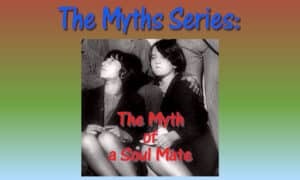
The Myth of a Soul Mate — soul mate thinking is one-sided thinking. Better to find a mirror.
Of Wayne’s many books, the one closest to today’s topic is: This Endless Moment

An excellent guide to life and living.
Learn to focus your attention of who you really are.
People have heard of “the soul mate” — the “one perfect person for me” crap–it’s a major movie and book theme, after all–so they frantically run around trying to find this mythic being.
There’s a flaw to this idea, however.I’ve heard various “takes” on this theme — people describing what they are looking for in a “soul mate” — and every time, what’s actually being said is something I call “placeholder theory.”
Placeholder theory is: “I was late for a meeting, so I (prayed, made an affirmation, etc.) and I drove into the parking lot, and just as I did, someone pulled out!”
That person in the waiting car is what I call a “placeholder.”Because the story-teller is so important, the other person’s only job is to “wait”… to hold a place for this special, special person.
Oddly, when I suggest to said special person that they too must have been a placeholder for another, “stronger” person, they get right annoyed with me. “Me? A placeholder? That would be… wrong!”
No kidding.When it comes to soul mate language, if you listen carefully, you’ll discover that the person sought isn’t someone “just perfect,” nor “just right.” The person being sought is “Someone who will do exactly what I want and be exactly who I want them to be.”
In other words, it’s Peter Pan looking for Wendy. Or vice versa.
It’s like Placeholder Theory because the “seeker of the soul mate” is the one in charge, dictating the terms, and the “placeholder” is just supposed to be sitting around, waiting to be found.
A servant, if you will. A foil.This is not to say that we shouldn’t seek compatibility when engaged in mate-picking.
The List of 50, a tool in my book, Find Your Perfect Partner, is all about this. When you create your list responsibly and without short-cuts, you discover that many people are a fit your temperament and nature.
I guess 5% of the population will fit, once you actually know what you are looking for.
That being said, after you’ve found a “compatibility fit,” the real work of communication and intimacy begins. You can read about that in The. Best. Relationship. Ever.
Not so with the soul mate as described above. That’s not relationship — that’s manipulation.
I knew a woman back in Seminary. When I first met her, she was married to a psychiatrist.
She told me (using “perfect partner” language) that she’d initially been attracted by his good looks, and then by how smart he was. She was excited, as she thought she was really smart — they could actually discuss stuff!
The marriage lasted less then 6 months.
Why did it end? “He argues with me. He was supposed to support me and make me feel good about myself!”
She said that she wanted to find a husband like me: I’d laugh and shake my head, because every time I challenged her — and I do challenge my friends — she’d piss herself right off, and stop talking to me to punish me.
I found the silence refreshing.
That summer she got a job at a camp, and in short order auditioned (the audition being first of dinner, and then between the sheets,) the entire male board of directors, and then the staff, looking for her soul mate (There were nearly 20 of them…)
None suited her — none were, she told me, suitably compliant and interested in being her soul mate.
But she didn’t give up. She got to the last guy in the place–the janitor–on the last few days of her job. He was perfect, she told me. “He listens to me! He tells me I’m doing great! He praises me endlessly! He’s perfect!” She married him.
A few years later she showed up on my doorstep, teary-eyed. She’d filed for divorce. Why? “He never has an opinion! All he does is agree with me! He never calls me on my stuff!”
I just smiled.You see, her version of “male soulmate” is: Does what I want. Builds me up. Agrees with me. Praises me as the smartest person in the room. Endlessly. And without reciprocity on my part.
We’d suggest that the actual purpose of being in relationship is to be with a person who provides a “talking mirror” for what you are doing. Not judgement, not a critique, just “feedback.”
And key to this: you provide this mirroring to your partner, same parameters. No demand for cheer-leading, no “Aren’t you just the most special thing?” Feedback. Compassion. Caring. In dialogue.
As we’ve endlessly said, if your relationships never seem to last, have a look at yourself and your balance.You only get what you are willing to give.
There are no “special people” in elegant relationships. Partners are not there to make you feel better about yourself, or to do your bidding. True, elegant partners witness both our wholeness and our fragmented-ness — not to fix us, but simply to be a witness.
And vice versa.
Thus, the only “soul mate” I want is someone who agrees that we’ll each work on ourselves first, and will do so through intimate dialogue with each other. We’ll remain curious about each other, without trying to change the other or control the other, and especially without becoming dependent on the other.
My partner is, above all, my equal.
And her name is Darbella.Are we “soul mates?” Nah. Intimate partners, engaged in intra-personal growth through dialogue. Of course! For 42 years, and counting!
This week, have a look at what you are looking for, or expecting, from your principal relationship. See if you can hold your ego in check long enough to really go for the depth.
Facebook TwitterAugust 11, 2024
The Myth of a Self — The Myths Series

Consider: How often do you find yourself miserable, judging your life to be awful or meaningless, and what happens then? Do you not find yourself asking some form of this question: “Why is this happening to me?”
Let’s explore the possibility that this is the wrong question…because there is no “you” that has a life.
Theoretical self-responsibility is popular. But being self-responsible, not so much. Suggest it, and out pop the excuses.
I notice that when I am having a miserable moment, I am creating it through how I am defining myself. This “misery-making” process is a dance between justification and story-inventing.
In order to escape into self-responsibility, I must take action. The drama stops as soon as I stop thinking that the story I tell myself is “real.”
Well, we might as well start with the hard stuff.You do not exist anywhere but here and now. Never did, never will. Amen.
Here is a Zen joke.
I told it and Darbella said,
“Am I supposed to get that?“
I answered, “Nope.”
How many Zen Masters does it take to change a light bulb?
Answer: The rose bush in the garden.
Get it?
Probably not.
I am not going to explain it to you, or not really. It is worth pondering a bit, though. Here is a hint: Waking up requires the dropping of pat, simplistic, and obvious answers.
Think about how you define yourself. Your parents, tribes, and community, by the way, taught this defining process to you. I wrote about this in This Endless Moment, in the Deconstruction section.
The process of defining yourself is always (and only) comparative.

If you consider the physical world, you will realize that we know, say, light because there is its opposite, darkness. This is the meaning of the yin/yang symbol — black contains white, white contains black, and both are interrelated and required in order to “locate” the other.
We establish our sense of self in the same way. Each thing we think we know about our self is based upon the couplet “me/not me.” I am a male and am not a female. I have blue eyes and not brown eyes. I am human, and not a buffalo, although I was born there.
Our ego, then, is really nothing more than an accumulation of identities, or “hats” that we drag out, so as to have something to say about ourselves.
We can add to that the idea of cultural norms, which are nothing more than agreed-upon lists of “good/bad.” As we note by looking around us and around the world, the jury is out on the contents of said lists — of the rightness or wrongness of pretty much everything.
It gets even more interesting when we move to “internal states.” Internal states are nothing more than how I am shuffling my stories to “prove” what I have predetermined is the cause of my present situation or self-definition.
Remembering our couplet rule, consider the statement, “My parents didn’t bring me up right.”
For me, such statements raise the question, “Compared to what?” To someone who was “bought up right,” I guess. There is, however, a problem here.
The person making this statement is comparing herself to a person she imagines to have been brought up “right,” or to what she read in a book, or learned in a class. She is comparing herself to “non-reality,” and finding herself lacking.

Let us suppose you talk to your best friend, whom you judge to be the “brought up right” example to your “not.” Your friend says, “But, I had a miserable childhood, I was deprived, even worse than you were!”
Now what can one do? Have a victim contest? Go to the crappy parenting tribunal, to get a “Who was raised worse” decision? (Actually, many people go to therapists for exactly this reason — to have an expert confirm their belief in their own victimhood.)
Then, the judgement starts. “I should not have been treated like that!”
This is simply and plainly silly.
“It’s not fair” changes nothing about who and where you are right now. Here is the bare truth of life (feel free to take notes ;-)).
Your life is as it is, and happened as it happened. It is a meaningless waste of time to suggest, “It should have been different,” because there is no different, and there is no should. Your life is (always and only) what happens, how you process it, and what you do with it.
While this may seem cold and calculating, defining yourself as a victim of your past changes nothing in the here and now. Endlessly telling all and sundry of your sad and sorry life changes precisely nothing in the here and now.
To repeat, “Why did this happen?” is a meaningless question. “What do I choose to do now?” on the other hand, has some potential.A client once told me a story of her self-described “stupidity and ineptitude.” She had dropped out of High School, had several failed relationships, got pregnant, got married, got pregnant, got separated, and showed up on my doorstep, 3 year old in one hand and a one year old in the other. Woe, oh woe, was she.
Her story was a well-practiced, internal comparison with what her ego told her she “should have been.” She berated herself endlessly that, at 23, her life was, and would always be, a failure.
I said, “Have a breath, and then tell me what you might choose to do differently with your life.”
For some bizarre reason, she looked at me, smiled, and said, “I want to be a nurse.” I said, “Walk down to the High School, enroll, get some child care, go to College, become a nurse.”
Rather than argue with me about the impossibility of such a thing, she looked at me with great curiosity, said, “Hmm. OK,” and went and did exactly that. Four years later, Darbella and I attended her graduation as an R.N.
All I can say is that she stopped identifying herself using her internal story of how hard done by she was, stayed present, and started doing things differently. None of this was easy, but she did it.
So, who was she? Was she the dud, the failure, the poor abused victim? Was she the single mom with no hope? Was she the successful student, the nurse? Of course not. Those are just stories, and not very helpful ones.
As she dropped the stories, she discovered that her life was a flow of present moments. She was who she was, each moment of the walk, and nothing more (or less) than this.
She heard me asking a question, asking her to find another way of looking at things, (the rose bush in the garden) and this broke her cycle of seeing things only one way. She had a breakthrough and that breakthrough was all about letting go of pre-defining her future based upon her stories of her past.
The Zen-ish idea of “no self” is how life is. I cannot show you any more of myself than who I am right now. Even as I tell you stories, all you see is me, right now, telling stories.
You do not see the “reality” of the story — even if you were there, watching it unfold with me, you would still see it differently than I did. That is why we call them stories.
My story, my sense of my self, is not “true.” I am only who I am right now. In this way, a sense of a fixed self is simply a convenience.
It is a useful tool to define myself as “Wayne.” Having this identity makes it possible for you to write me a letter, allows the government to know what to put on my passport, and I can easily remember I wear a shirt with a 15-inch collar.
My mother mentioned that they were going to call me Darryl, and I am no more Darryl than Wayne. I may be male, but this label is only useful for entering the right washroom. I actually think that unisex washrooms make more sense anyway.
I grew up more privileged than some and less privileged than others, sucked at relationships until I didn’t, and to this day catch myself judging that I am unloved, or not loved enough, judging that I am excellent, or middling, or a failure at something.
I find myself imagining all kinds of dire outcomes for my life, and then I remember I do not have a life. I have this moment, and this moment is pretty damn alright.

My story of my past is fluid and flexible, and I dredge up examples (or invent them  ) that prove whatever point I am trying to make. I am thus “more” something and “less” another because of the stories I select.
) that prove whatever point I am trying to make. I am thus “more” something and “less” another because of the stories I select.
Perversely, if I am desperate to prove some story regarding my imaginary life or self, I just twist the story in my head to make it fit. That will be the moment that Dar turns to me and says, “You might want to get over yourself.”
I give my head a shake and feel the heat of embarrassment.
It’s time to poke holes in the stories you tell yourself. I want you to join me and give your head a shake, and to wonder over the foolishness that goes on between your ears.
This foolishness, by the way, will go on until you die. All we can hope for is an acute awareness that it is happening, and then a sense of humour.
From this place, we can be like my client. She did not deny her past (hard to do, considering the two kids she carried with her,) nor did she declare her life to be a closed book.
She looked at her choices, noticed her judgements, and decided to do something different anyway.
I know that it is a stretch to understand that you have no past, no history, and no self. All you are right now is whatever you believe that you are. Your subconscious mind is expert and creating drama and “evidence” for whatever you are shovelling.
If you will consider the possibility that this is so, you can begin to act in this moment, not out of habit but out of choiceful focus. You can do what needs doing, in this moment, without all of the “But… I can’t! (Sob, sniffle.)” nonsense.
The essence of being is to recognize our non-being — our non-self-ing. In this space, I, and you, and the universe are One — the same “stuff,” manifesting for a while in a certain “package,” and soon to return to formlessness.
It is a lot to wrap your head around, and in a sense, you cannot. One moment it makes no sense, and in the next, it does, at some deep, intuitive level. It is what I call the moment-by-moment path of waking up.
Facebook TwitterAugust 4, 2024
The Myth of Altruism — The Myths Series

The Myth of Altruism — it’s actually pretty hard to find a selfless act. most acts that seem selfless are anything but.

My first and most popular book,
This Endless Moment.
Learn to live a full and satisfying life.
Regard for others, both natural and moral; devotion to the interests of others; brotherly kindness — opposed to egoism or selfishness. — : Webster’s Revised Unabridged Dictionary, ? 1996, 1998 MICRA, Inc.
The question arises: is it possible to commit a truly selfless act? I suspect that it is possible… but it happens rarely.
“Nonsense!” people scream. “Day in and day out I make sacrifices for my (parents, spouse, kids, customers, employer, employees). The real question is, why don’t they ever appreciate my sacrifices?”
As we listen to people shovelling this bilge, we are supposed to nod knowingly, and think or say, “What a saint! Look at all (s)he puts up with. And doesn’t even get a thank-you, let alone payback.”
Which then causes us to ask, if payback was expected, how could the act be altruistic?Altruism might also be defined as “an action without thought of reward.”
Let’s get real and look at how life generally is:Most people have not been taught to stand up and go for what they need. Most people do not even know how to ask for what they need.Other people, when they ask for something, expect 100% compliance. If they get rejected by their parents, spouse, kids, customers, employer, employees, they simply stop asking and start manipulating. As opposed to asking someone else, or meeting their own needs.What the majority call altruism is actually manipulation. It’s acting or speaking in a certain way, in order to get what we want or to get a reward.
As usual, our parents taught us how to do this.“When you behave like that, you make mommy sad.” I’ve actually heard parents use this line, as opposed to, “If you do that again, here is the consequence,” and then applying it.
The first “you make me…(whatever)” approach teaches the child that their goal in life should be to “make ‘mommy’ happy.” Or whatever. The idea is,
I act,you feel something, and somehow it’s my fault that you chose to feel what you’re feeling.But back to sad-unhappy. I will ask, “Why the hell should I or anyone else care if you choose to make yourself unhappy? Besides, no one can make you feel!”
Most folk, however, have heard variations on this theme since they were hatched, and actually believe they have the power to affect another’s feelings. From there, it’s a short leap to, “It’s my duty to make others happy.”
Parents utter this line for only one reason — they want to stop a certain behaviour. They, as children, were taught to look to their parents for cues about what pleased them; if they were wise, they then did the pleasing behaviour.
Interestingly, most children comply not out of a fear of consequences, but because they were trained to avoid displeasing. Paradoxically, we learn from this to manipulate others through our behaviour. If I behave a certain way, mommy will love me and smile at me. And vice versa.
So, if I want something from mommy, I’ll do all the things she likes, and then she will owe me what I want.
I did what she wants; she’ll have to do what I want.Initially, when we were small, this was how it worked. You’re sulking, daddy says “lighten up,” and you do, and he gives you a treat.
By the time we’re teens, it seldom works that way. We do something that’s supposed guarantee that good old dad will be obligated to give us the car keys, and he doesn’t. Then we scream that dad’s not being fair. (See The Myth of Fairness)
We either try again, (and again, and again) or declare dad to be hopeless. We decide to find a spouse to manipulate instead. Or we have a kid, and play the same game with their heads that were played with ours.
Phony altruistic acts are done in the name of love, yet are methods to manipulate others into doing what they aren’t doing, or don’t want to do.I had a client who grew up with parents that criticized everything about her. Her looks, clothes, choices, all were judged to be lacking. They continued to do this all through her sessions. She wanted her mom and dad to love her, so she kept telling them all she accomplished, hoping for praise.
She never got what she was looking for.
She had a 19-year-old son, who got by, by the skin of his teeth. She considered him irresponsible.
One time, she heard a rumor that his college course was going to start early, and he’d dome nothing about it. She told me how she’d called the college, found out it was true, made several calls to the school and to her parents to find the money, and got everything sorted out for her son.
She was beaming as she told me what she had done.
I asked her if she could explain to me how doing all of that helped her son to be more responsible.
She said, “I really resent you for pointing that out to me.”
I congratulated her for being honest. I also said that her resentment was not going to cause me any loss of sleep. My job was not to get her to like me.
After some thought, she admitted that she had been looking for praise from me, and what she wanted praise for was for being a good mother (better than her mother.)
She grudgingly realized that by acting as she had, and by then letting her son know how she’d bailed out his chestnuts yet again, she was saying, “See. You can’t get along without me! Now tell me how wonderful I am!”
This was exactly the opposite of her avowed purpose of getting him out on his own, standing on his own two feet. Her action, far from altruistic, was a manipulative rescue, meant to keep her son in his place as an incompetent.
Most “altruistic acts” are exactly like this.True altruism is not a bargain of the “I’ll do this so that you do that” sort.
The alternative to all of this is being aware of myself. I pay attention to the games I’m playing, and let people I reust in on the madness going on between my ears.
This week, ask for what you want, directly. If the person refuses, ask the person if they know why they are refusing, and whether they’d be willing to dialog about it. If the people you are in relationship with continually refuse your direct, non-manipulative requests, ask yourself why you are in relationship with them.
Notice when you are trying to manipulate people into doing what you want — by lying, misdirection, false complements or endless criticism. Ask yourself why you need to play this game.
Stop being a martyr, just for an hour or so. Stop feeling sorry for yourself for an afternoon. Stop whining about how awful the world is for a whole day.
Ask yourself why you have set your life up to be like this. (Who’d you think set it up???) Tell a few people about the games you play, about your insecurities, about the manipulations that you give in to attempting. Then vow to stop yourself.
Go where you need to go to get what you want. Do what you need to do for you, not to make someone else happy.
Give up on “I’ll wash your back if you wash mine.” Wash. Don’t wash. Because you choose to, not for what you hope you’ll get. (You’ll be disappointed. Even if you get it, you’ll know it was coerced, not freely given.)
This week, get over yourself.
Facebook TwitterThe Myth of Altruism — The Myths Series

The Myth of Altruism — it’s actually pretty hard to find a selfless act. most acts that seem selfless are anything but.

My first and most popular book,
This Endless Moment.
Learn to live a full and satisfying life.
Regard for others, both natural and moral; devotion to the interests of others; brotherly kindness — opposed to egoism or selfishness. — : Webster’s Revised Unabridged Dictionary, ? 1996, 1998 MICRA, Inc.
The question arises: is it possible to commit a truly selfless act? I suspect that it is possible… but it happens rarely.
“Nonsense!” people scream. “Day in and day out I make sacrifices for my (parents, spouse, kids, customers, employer, employees). The real question is, why don’t they ever appreciate my sacrifices?”
As we listen to people shovelling this bilge, we are supposed to nod knowingly, and think or say, “What a saint! Look at all (s)he puts up with. And doesn’t even get a thank-you, let alone payback.”
Which then causes us to ask, if payback was expected, how could the act be altruistic?Altruism might also be defined as “an action without thought of reward.”
Let’s get real and look at how life generally is:Most people have not been taught to stand up and go for what they need. Most people do not even know how to ask for what they need.Other people, when they ask for something, expect 100% compliance. If they get rejected by their parents, spouse, kids, customers, employer, employees, they simply stop asking and start manipulating. As opposed to asking someone else, or meeting their own needs.What the majority call altruism is actually manipulation. It’s acting or speaking in a certain way, in order to get what we want or to get a reward.
As usual, our parents taught us how to do this.“When you behave like that, you make mommy sad.” I’ve actually heard parents use this line, as opposed to, “If you do that again, here is the consequence,” and then applying it.
The first “you make me…(whatever)” approach teaches the child that their goal in life should be to “make ‘mommy’ happy.” Or whatever. The idea is,
I act,you feel something, and somehow it’s my fault that you chose to feel what you’re feeling.But back to sad-unhappy. I will ask, “Why the hell should I or anyone else care if you choose to make yourself unhappy? Besides, no one can make you feel!”
Most folk, however, have heard variations on this theme since they were hatched, and actually believe they have the power to affect another’s feelings. From there, it’s a short leap to, “It’s my duty to make others happy.”
Parents utter this line for only one reason — they want to stop a certain behaviour. They, as children, were taught to look to their parents for cues about what pleased them; if they were wise, they then did the pleasing behaviour.
Interestingly, most children comply not out of a fear of consequences, but because they were trained to avoid displeasing. Paradoxically, we learn from this to manipulate others through our behaviour. If I behave a certain way, mommy will love me and smile at me. And vice versa.
So, if I want something from mommy, I’ll do all the things she likes, and then she will owe me what I want.
I did what she wants; she’ll have to do what I want.Initially, when we were small, this was how it worked. You’re sulking, daddy says “lighten up,” and you do, and he gives you a treat.
By the time we’re teens, it seldom works that way. We do something that’s supposed guarantee that good old dad will be obligated to give us the car keys, and he doesn’t. Then we scream that dad’s not being fair. (See The Myth of Fairness)
We either try again, (and again, and again) or declare dad to be hopeless. We decide to find a spouse to manipulate instead. Or we have a kid, and play the same game with their heads that were played with ours.
Phony altruistic acts are done in the name of love, yet are methods to manipulate others into doing what they aren’t doing, or don’t want to do.I had a client who grew up with parents that criticized everything about her. Her looks, clothes, choices, all were judged to be lacking. They continued to do this all through her sessions. She wanted her mom and dad to love her, so she kept telling them all she accomplished, hoping for praise.
She never got what she was looking for.
She had a 19-year-old son, who got by, by the skin of his teeth. She considered him irresponsible.
One time, she heard a rumor that his college course was going to start early, and he’d dome nothing about it. She told me how she’d called the college, found out it was true, made several calls to the school and to her parents to find the money, and got everything sorted out for her son.
She was beaming as she told me what she had done.
I asked her if she could explain to me how doing all of that helped her son to be more responsible.
She said, “I really resent you for pointing that out to me.”
I congratulated her for being honest. I also said that her resentment was not going to cause me any loss of sleep. My job was not to get her to like me.
After some thought, she admitted that she had been looking for praise from me, and what she wanted praise for was for being a good mother (better than her mother.)
She grudgingly realized that by acting as she had, and by then letting her son know how she’d bailed out his chestnuts yet again, she was saying, “See. You can’t get along without me! Now tell me how wonderful I am!”
This was exactly the opposite of her avowed purpose of getting him out on his own, standing on his own two feet. Her action, far from altruistic, was a manipulative rescue, meant to keep her son in his place as an incompetent.
Most “altruistic acts” are exactly like this.True altruism is not a bargain of the “I’ll do this so that you do that” sort.
The alternative to all of this is being aware of myself. I pay attention to the games I’m playing, and let people I reust in on the madness going on between my ears.
This week, ask for what you want, directly. If the person refuses, ask the person if they know why they are refusing, and whether they’d be willing to dialog about it. If the people you are in relationship with continually refuse your direct, non-manipulative requests, ask yourself why you are in relationship with them.
Notice when you are trying to manipulate people into doing what you want — by lying, misdirection, false complements or endless criticism. Ask yourself why you need to play this game.
Stop being a martyr, just for an hour or so. Stop feeling sorry for yourself for an afternoon. Stop whining about how awful the world is for a whole day.
Ask yourself why you have set your life up to be like this. (Who’d you think set it up???) Tell a few people about the games you play, about your insecurities, about the manipulations that you give in to attempting. Then vow to stop yourself.
Go where you need to go to get what you want. Do what you need to do for you, not to make someone else happy.
Give up on “I’ll wash your back if you wash mine.” Wash. Don’t wash. Because you choose to, not for what you hope you’ll get. (You’ll be disappointed. Even if you get it, you’ll know it was coerced, not freely given.)
This week, get over yourself.
Facebook Twitter


